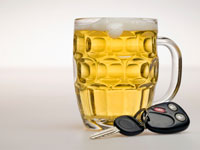Appeals court clarifies alternative “testing” rights and
obligations in OWI case
When stopped and arrested for operating a vehicle while intoxicated,
the arrested individual has the choice to accept an alternative test
administered by police, or an alternative test administered by a
qualified person of the suspect's choosing, not both.
By Joe Forward, Legal Writer,
State Bar of Wisconsin
 Oct. 12, 2010
– After taking a primary “blood, breath, or urine”
test, a person suspected of operating under the influence of drugs or
alcohol has two options in choosing a second, alternative test. But the
law does not require police to offer a third.
Oct. 12, 2010
– After taking a primary “blood, breath, or urine”
test, a person suspected of operating under the influence of drugs or
alcohol has two options in choosing a second, alternative test. But the
law does not require police to offer a third.
In State
v. Batt, 2009AP3069-CR (Oct. 6, 2010), Lee Batt argued that
Wisconsin law requires law enforcement to offer both an alternative test
at police expense and a reasonable opportunity for the OWI suspect to
obtain a third test at the suspect’s own expense.
But the District II Wisconsin appeals court held that police must
provide a second test of its choice at police expense and “if the
second test is refused by the suspect in favor of one at his or her own
expense, police must provide reasonable opportunity for a test of the
suspect’s choice at the suspect’s expense.” The law
does not require both.
The statute
In 2008, police stopped Batt to investigate an anonymous tip that his
vehicle was one of two speeding near a park in Sheboygan. Subsequently,
Batt was arrested on a sixth OWI offense, a felony charge.
Batt agreed to take a primary blood test, and then asked for an
alternative breath test. Batt also requested a third test by a qualified
person at his own expense, but never received one.
Under Wis. Stat. section 343.305(4), a suspect that submits to a
primary breath, blood, or urine test to determine the system’s
alcohol or drug levels is allowed take an “alternative
test.”
Under section 343.305(5)(a), “[t]he person who submits to the
[primary] test is permitted, upon his or her request, the alternative
test provided by the agency … or, at his or her own expense,
reasonable opportunity to have any qualified person of his or her own
choosing administer a chemical test. …”
Batt’s trial lawyer moved to suppress the results of the blood
and breath tests on the basis that Batt did not get a reasonable
opportunity for a third alternative test at his own expense. The motion
was denied, and Batt pled no contest. He appealed.
Appeals court
Batt relied on State v. Stary, 187 Wis. 2d 266, 522 N.W.2d 32
(Ct. App. 1994) to argue that police must provide, at the
suspect’s request, both an alternative test at police expense and
an alternative test at the suspect’s own expense.
In Stary, however, the suspect refused an alternative test at
police expense and obtained one at his own expense. Thus, as the appeals
court explained, “the Stary court was not considering
whether a defendant was entitled to a reasonable opportunity to a third
test after receiving a second test at agency expense.”
The court noted a supreme court case explaining that section
343.305(5)(a) is intended to give indigent drivers an opportunity for an
alternative test regarding intoxication levels.
“[I]f we were to adopt Batt’s interpretation of section
343.305(5)(a), people who could afford to would have the advantage of
taking three tests, while the indigent and those less well-off would be
hard pressed to do the same. This cannot be what the legislature
intended,” the appeals court wrote.
Thus, the court concluded that once Batt accepted a second test at
police expense, “law enforcement was not obligated to give him a
reasonable opportunity to obtain a test at his own expense.”
Reasonable suspicion
Batt also moved to suppress the breath and blood tests on the grounds
that police officers did not have reasonable suspicion of unlawful
activity to pull him over.
But the court rejected this claim because the anonymous tipster
provided a sufficient description of the vehicle, and people close to
the scene gestured towards the vehicle as police passed by.
“Because the criminal activity [the officer] was originally
investigating (speeding) would have been visible to the public, [the
officer] had no reason to doubt the basis of the anonymous
tipster’s knowledge,” the court explained.
